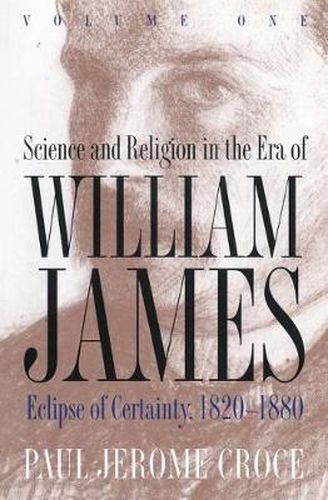Readings Newsletter
Become a Readings Member to make your shopping experience even easier.
Sign in or sign up for free!
You’re not far away from qualifying for FREE standard shipping within Australia
You’ve qualified for FREE standard shipping within Australia
The cart is loading…






In this cultural biography, Paul Croce investigates the contexts surrounding the early intellectual development of American philosopher William James (1842-1910). Croce places the young James at the center of key scientific and religious debates in American intellectual life between the 1820s and 1870s.
Early in the nineteenth century, most Americans maintained their scientific and religious beliefs with certainty. Well before the end of the century, however, science and religion had parted company, and, despite the endurance of religious convictions and widespread confidence in science, professionals in both fields expressed belief in terms of hypotheses and probabilities rather than absolutes. Croce highlights the essential issues debated during this shift by investigating the education of James and the circle of intellectuals of which he was part. In particular, the implicit probabilism of Charles Darwin’s theory of natural selection, especially as interpreted by Charles Sanders Peirce’s recognition of the fallibility of knowledge, set the stage for James’s reconstruction of belief based on uncertainty.
Croce is writing a second volume dealing with the intellectual development of the mature William James.
$9.00 standard shipping within Australia
FREE standard shipping within Australia for orders over $100.00
Express & International shipping calculated at checkout
In this cultural biography, Paul Croce investigates the contexts surrounding the early intellectual development of American philosopher William James (1842-1910). Croce places the young James at the center of key scientific and religious debates in American intellectual life between the 1820s and 1870s.
Early in the nineteenth century, most Americans maintained their scientific and religious beliefs with certainty. Well before the end of the century, however, science and religion had parted company, and, despite the endurance of religious convictions and widespread confidence in science, professionals in both fields expressed belief in terms of hypotheses and probabilities rather than absolutes. Croce highlights the essential issues debated during this shift by investigating the education of James and the circle of intellectuals of which he was part. In particular, the implicit probabilism of Charles Darwin’s theory of natural selection, especially as interpreted by Charles Sanders Peirce’s recognition of the fallibility of knowledge, set the stage for James’s reconstruction of belief based on uncertainty.
Croce is writing a second volume dealing with the intellectual development of the mature William James.